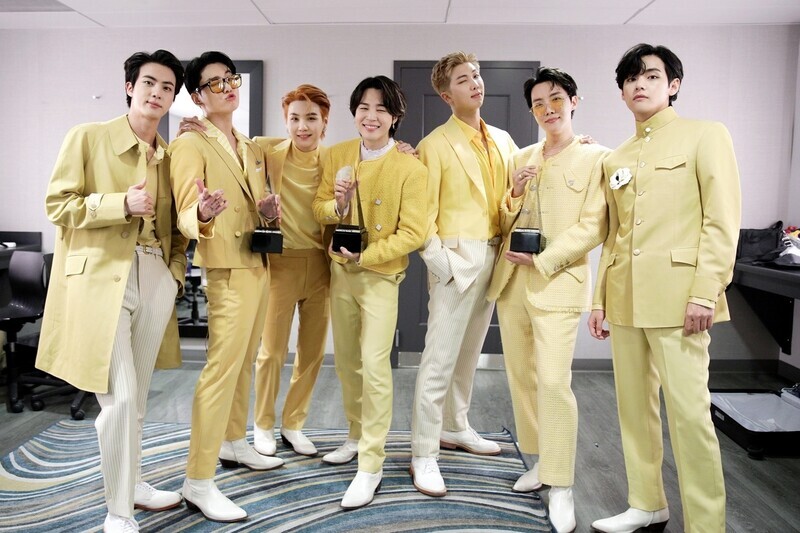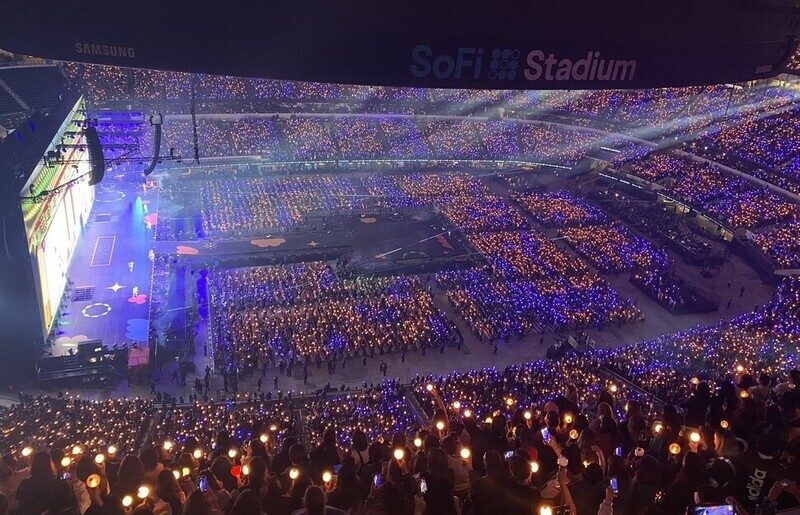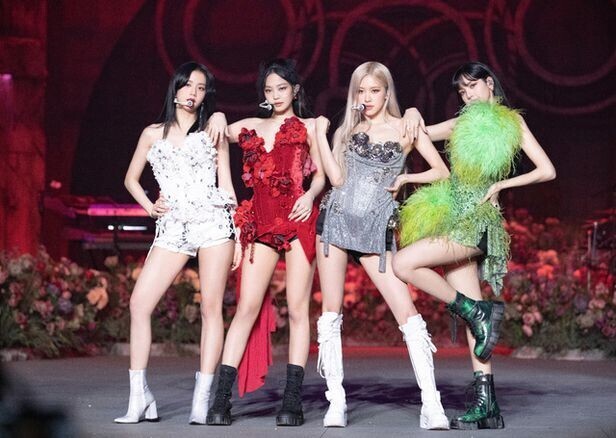hankyoreh
Links to other country sites 다른 나라 사이트 링크
Positive vibes and broad appeal: How Korean content is becoming mainstream in US

"K-pop and Korean content are graduating from a subculture and going mainstream in the United States, the empire of popular culture.”
This is according to Kim Suk-young, a professor of theater and performance studies at the University of California, Los Angeles. When we spoke on Nov. 25 of last year, she pointed out that although K-pop and K-content used to be consumed by specific audiences and age groups in the past, they are quickly becoming more mainstream and popular among the general public.
The day that we spoke, about a dozen international students from across Asia had gathered at Kim’s home to celebrate Thanksgiving.
Chen, an international student from Taiwan, showed us a video of the UCLA marching band performing a BTS song, saying that it had been the talk of the school at the time. Meanwhile, Wang, an international student from China, listed off the names of all the Korean idols they knew, including Blackpink and Twice.
Mere days later, more than 210,000 people gathered for BTS’ concert “BTS Permission to Dance on Stage – LA,” which consisted of four shows between Nov. 27-28 and Dec. 1-2.
The popularity of K-pop can also be verified by increasing sales of songs and albums. BTS set the highest-selling digital music record in the US for the second consecutive year with "Butter" in 2021 (1.89 million downloads) following “Dynamite” in 2020 (1.26 million downloads).
According to rankings tabulated by the world’s largest music streaming platform, Spotify, BTS was the third-most-streamed artist after Bad Bunny at No. 1 and Taylor Swift at No. 2. The 10 most-streamed Korean artists worldwide last year on Spotify collectively exceeded 13.7 billion streams.
This is a 29% increase from the previous year’s 10.6 billion streams. In addition, if we look at Ktown4u, an online shopping mall that sells K-pop albums and goods, sales increased more than fivefold in two years from 2.7 billion won in 2019 to 14.9 billion won in 2021.

2022 is expected to be the first year of Korean culture’s global ascendancy. Just as British rock sparked the so-called British Invasion in the US, led by the Beatles in the 1960s, more than a few people are noting that 2022 may well be the year of the K-Invasion.
The great leap of Korean culture, propelled by BTS and Netflix's original series “Squid Game” last year, picked up even more momentum this week with Oh Young-soo’s winning of a Golden Globe.
On Sunday, 78-year-old Oh Young-soo became the first Korean actor ever to win a Golden Globe, being recognized for his supporting role on the series “Squid Game.” Although "Squid Game" failed to pick up awards for best series or best actor, the fact that the show was nominated in these categories illustrates the change in the stature of Korean dramas. But it’s not just Korean shows and movies that are enjoying a boost in popularity.
Entertainment agencies in Korea are currently holding audition programs to scout K-pop singers who will be active in the US. Case in point, SM Entertainment is holding auditions in partnership with Hollywood production company MGM for the boy group NCT-Hollywood that will be active in the US.
Hybe, the entertainment company behind BTS, will also form a strategic partnership with Universal Music Group to plan a female K-pop group debut project in the United States.

On Nov. 26 of last year, the streets of LA were flooded with purple ahead of BTS’ concerts there.
Among the members of BTS’ fan club known as “Army” wearing purple outfits, I ran into Joanne Lee, a woman in her 50s from Houston, Texas, who found her way into the BTS fandom a few years ago.
“I started a business four years ago, and poured a lot of money into it. I lost about 2 million dollars. At that time, a friend sent me a song called ‘Two! Three!’ and another called ‘Epilogue - Young Forever’ by BTS.”
Saying she was too old to listen to boy bands, she didn’t bother listening to the songs until she later encountered the Korean idol group’s music by chance.
"When I felt that the world had turned its back [on me], the songs were a great comfort. I was so moved that I stopped my car on the side of the highway and cried until a police car eventually pulled up."

The age range of K-pop fans in the US is expanding — from millennials and Gen Z to those in their 50s and 60s. But this phenomenon isn’t just limited to K-Pop.
According to Kim Suk-young, "Korean dramas were originally only watched by middle-aged Asian women.”
“Since the mid-2000s, they’ve spread to younger Americans, and now [dramas] have even gained a viewership among middle-aged men who had no prior interest in Korea at all,” Kim added.
Meanwhile, younger generations’ devotion to K-pop is becoming all the stronger.
Amy Paola Ochoa, a concert-goer in her 20s, showed off her Army light sticks and boasted, "I bought 600 dollars’ worth of BTS merch today alone."
Kim sees the roots of K-pop’s popularity in the US as lying beyond the factors of age, nationality, and race, and instead in the social and environmental characteristics of the country.
“These days, young Americans are very interested in social issues such as vegetarianism, opposition to unethical animal breeding, and other ethical issues important to consumers. K-pop artists listen to these kinds of stories and spread the word [about such issues].”
Park Sun-hwa, who operates a YouTube channel dedicated to music in the United States, also mentioned some cultural reasons behind K-pop’s popularity stateside.
“American parents like BTS. Many songs sung by American rappers and other artists contain profanity, violence, and sexual content. But BTS is different. They say, ‘love me, who is lacking.’ American parents want BTS to keep sending these sorts of messages to their children.”

K-pop group Blackpink has had a similar experience, pushing aside Canadian pop singer Justin Bieber to claim the title of the musical artist or group with the most subscribers on YouTube last September. Then in October, the group drew attention to the issue of environmental pollution while delivering a speech for “Dear Earth,” an environmental campaign put on by Google.
“Everyone already knows that Blackpink is the queen of YouTube. But for them to literally become number one is symbolic. They’re trying to use their influence to send a good message [to the world],” said Joojong Joe, president of YG Entertainment USA.
K-pop is also changing fan culture in the US. In addition to cheering for singers, fans are also drawing upon the strength of solidarity to support social causes. Last June, Americans in Army, as the BTS fan club is known, offered their support to Black Lives Matter, the movement combatting discrimination against Black people, and to the outcry over hate crimes against Asians, which have been on the rise since the outbreak of COVID-19.
Kim traces those changes back to Korean fan clubs. “American fans tend to listen to the music genres they enjoy. But Korean fan clubs are fierce and don’t hesitate to raise issues with entertainment companies. There are clear indications that this Korean fan club culture is being adopted in fandoms around the world. Army members even boycotted Hybe” — the parent company of Big Hit Music, which manages BTS — “because they regarded its NFT project as being too commercial.”

Other K-pop groups including Seventeen, NCT 127, SuperM, Tomorrow X Together, and Itzy have all charted on Billboard and are gunning for the top this year. Twice and Ateez will both be doing concert tours in the US this year.
“Right now, the US is primed to accept a second or third group like BTS. The American market is wide open. The cultural center recently hosted a K-pop festival, and there was a tremendous response even though the artists are new in Korea,” said Park Wi-jin, director of the Korean Cultural Center in Los Angeles.

Following its release on Dec. 24, “The Silent Sea” rose to third place for Netflix TV shows around the world, FlixPatrol reported. Earlier, “Hellbound” had shot up to No. 1 just one day after its release. There has been a definite rise in the popularity of Korean media around the world following the “Squid Game” craze.
This year is expected to witness a no-holds-barred competition between global streaming services such as Netflix, Disney+ and Apple TV+. The money they pour into new films and TV series is likely to add up to the hundreds of billions of dollars.
Last month, the Financial Times reported that Disney+ and Netflix will be investing US$23 billion and US$17 billion, respectively, in producing new media content this year, quoting an analysis by US investment bank Morgan Stanley. That would be 35%-40% more for Disney+ and 25% more for Netflix than last year.

One of the main targets of the funding secured by these streaming services is thought to be Korean media content. The success of “Squid Game” has already demonstrated that Korean media is fully capable of reaching people around the world. Media streamers are likely to brawl over the chance to get their hands on the next “Squid Game.”
“These days, broadcasting content agents in the US are aware of what dramas have come out in Korea and which ones are popular. As even Americans run low on ideas, they’re looking elsewhere for fresh material for series. There’s a strong sense that Korean media’s star has risen,” said Ju Seong-ho, director of the Korea Creative Content Agency’s USA Business Center.


That growing prestige is leading to more investment in Korea, which is regarded as a reservoir of media content. Since entering the Korean market, Netflix has invested more than 1 trillion won into media of various genres, including “Squid Game,” “The Silent Sea” and “Single’s Inferno,” through 2021.
With more money to spend, Netflix has invested in more media properties, up from four in 2018 to 20 in 2021.
Ko Hyun-joo, PR director for Netflix Korea, offered the following thoughts about this investment. “Through its continuing cooperation with the Korean creative industry, Netflix is showing that awesome stories can be produced anywhere and transcend borders.”
Netflix isn’t the only streamer moving in this direction. Disney+ just launched in Korea last November, but this year it’s investing in TV shows including “Moving,” “Rookie Cops” and “Grid.”
Apple TV+ launched “Dr. Brain” last year and is working on “Pachinko” (starring Youn Yuh-jung and Lee Min-ho) for release this year.

Local entertainment firms are also taking steps to expand Korean media content. Last November, CJ ENM acquired an 80% stake in Endeavor Content, a producer and distributor of Hollywood content, for US$775 million. That was the third-largest acquisition in the history of the CJ Group. CJ’s apparent strategy is to have Endeavor Content distribute its intellectual properties in North and South America.
Some have been cautiously raising concerns. “Hong Kong cinema used to be really popular, but people lost interest because it kept cycling through the same stories and styles. There’s a lesson we need to learn there,” Ju said.
“We need to make a variety of stories and take different approaches. The entertainment sector is like a shark — if it stops moving, it dies. We’ve got to keep swimming even when we’re asleep.”
By Jung Hyuk-june, staff reporter
Please direct questions or comments to [english@hani.co.kr]

Editorial・opinion
![[Column] Park Geun-hye déjà vu in Yoon Suk-yeol [Column] Park Geun-hye déjà vu in Yoon Suk-yeol](https://flexible.img.hani.co.kr/flexible/normal/500/300/imgdb/original/2024/0424/651713945113788.jpg) [Column] Park Geun-hye déjà vu in Yoon Suk-yeol
[Column] Park Geun-hye déjà vu in Yoon Suk-yeol![[Editorial] New weight of N. Korea’s nuclear threats makes dialogue all the more urgent [Editorial] New weight of N. Korea’s nuclear threats makes dialogue all the more urgent](https://flexible.img.hani.co.kr/flexible/normal/500/300/imgdb/original/2024/0424/7317139454662664.jpg) [Editorial] New weight of N. Korea’s nuclear threats makes dialogue all the more urgent
[Editorial] New weight of N. Korea’s nuclear threats makes dialogue all the more urgent- [Guest essay] The real reason Korea’s new right wants to dub Rhee a founding father
- [Column] ‘Choson’: Is it time we start referring to N. Korea in its own terms?
- [Editorial] Japan’s rewriting of history with Korea has gone too far
- [Column] The president’s questionable capacity for dialogue
- [Column] Are chaebol firms just pizza pies for families to divvy up as they please?
- [Column] Has Korea, too, crossed the Rubicon on China?
- [Correspondent’s column] In Japan’s alliance with US, echoes of its past alliances with UK
- [Editorial] Does Yoon think the Korean public is wrong?
Most viewed articles
- 1‘We must say no’: Seoul defense chief on Korean, USFK involvement in hypothetical Taiwan crisis
- 2N. Korean delegation’s trip to Iran shows how Pyongyang is leveraging ties with Moscow
- 3‘Weddingflation’ breaks the bank for Korean couples-to-be
- 4Korea sees more deaths than births for 52nd consecutive month in February
- 546% of cases of violence against women in Korea perpetrated by intimate partner, study finds
- 6Will NewJeans end up collateral damage in internal feud at K-pop juggernaut Hybe?
- 7[Column] Park Geun-hye déjà vu in Yoon Suk-yeol
- 8[Editorial] New weight of N. Korea’s nuclear threats makes dialogue all the more urgent
- 9Amnesty notes ‘erosion’ of freedom of expression in Korea in annual human rights report
- 10“Parental care contracts” increasingly common in South Korea